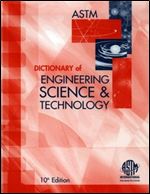
Subject-specific dictionaries are reference books that contain an alphabetical list of words with information about them that is specific to that particular subject and not necessarily generic like you would find in an average, everyday dictionary.
 Dictionary of Engineering Acronyms and Abbreviations, 2e
by
Dictionary of Engineering Acronyms and Abbreviations, 2e
by
 ASTM Dictionary of Engineering Science & Technology, 10e
by
ASTM Dictionary of Engineering Science & Technology, 10e
by


